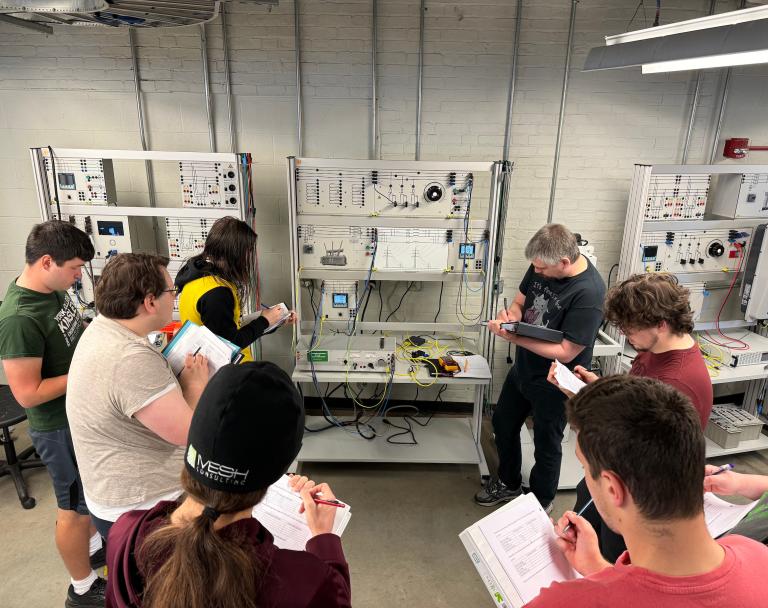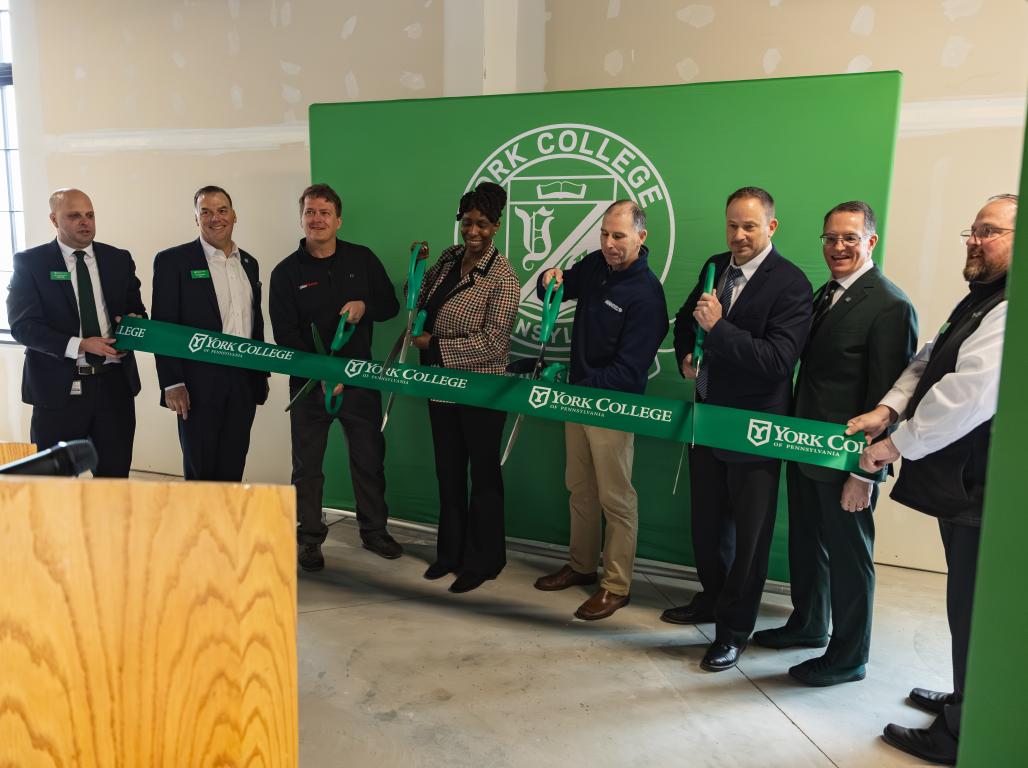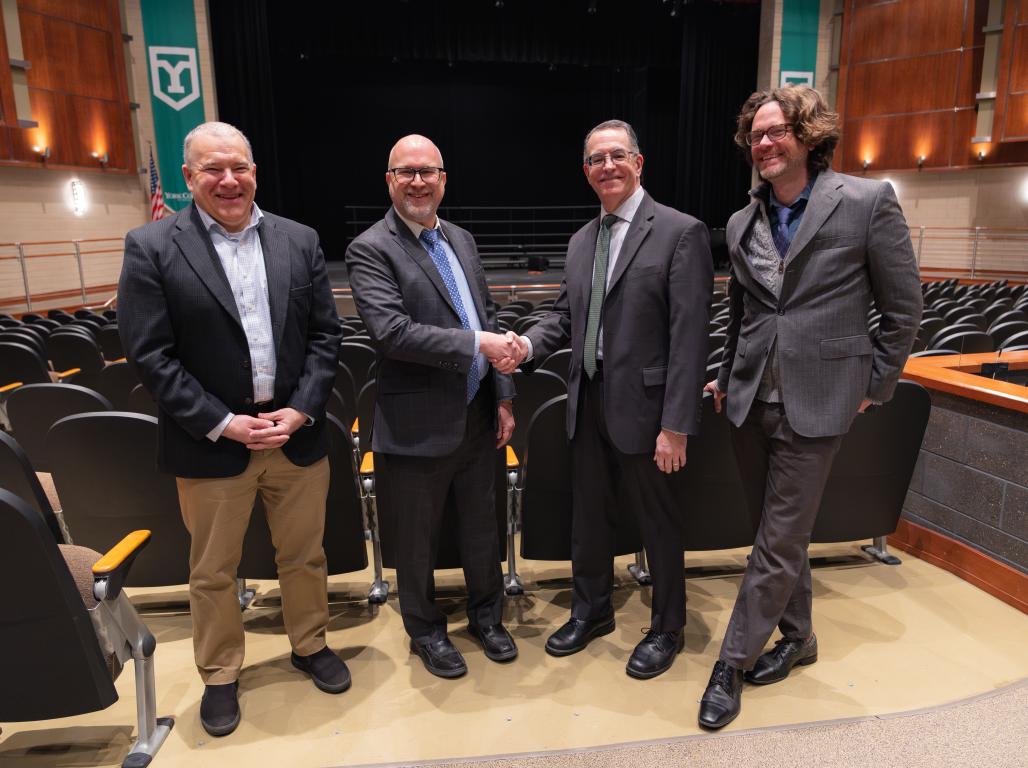York College Unveils Cutting-edge Smart Power Grid Laboratory

With the new lab installed, Engineering majors have access to state-of-the-art research capabilities in the realm of power engineering.
York College of Pennsylvania has taken a leap forward in its Engineering program with the inauguration of its state-of-the-art Smart Power Grid Laboratory at the Kinsley Engineering Center. Spearheaded by Kala Meah, Ph.D., Professor and Assessment Director of Electrical and Computer Engineering, this groundbreaking space promises to reshape the landscape of engineering education and power grid research.
Dr. Meah, who has worked at York College since January 2008, proposed the project two years ago to the Huber Foundation, which provided funding for the lab. The project cost around $320,000 including equipment, installation, and training.
Building out the lab took meticulous planning. After installation and training in December 2023, Dr. Meah began developing lab sessions for his Power Systems class in the Spring 2024 semester. Students were able to experience how a 300-km-long power line transmits electricity from a generation plant to cities.
“We had never had the opportunity to see how these work,” he says. “For the first time, we can go into the lab and see what I’m talking about in the class at work.”
Hands-on renewable-energy research
The Smart Power Grid Laboratory is equipped with five cutting-edge power transmission and microgrid workstations sourced from Lucas-Nuelle, a machinery and systems engineering company based in Germany. Each workstation is designed to offer students a comprehensive understanding of power generation, transmission, and distribution from various sources.
Each of the workstations focuses on a different area of power generation. Station one allows students to see how they can automatically control the voltage of electricity transmitted to customers. Station two provides hands-on learning for solar micropower grids. Station three emulates a wind turbine, while station four helps students identify faults in a power grid. The final station allows students to experiment with a multiline power bus-bar system in which every power line can connect and supply different loads.
Integral to the lab’s curriculum is the study of renewable-energy sources. By simulating scenarios such as solar energy generation and wind turbine operation, students gain insights into the complexities of modern power systems.
“Now, students can learn in a hands-on approach, preparing them for real-world applications,” Dr. Meah says.
Sam Diskin ’25, an Electrical Engineering major from Exton, PA, appreciates the lab’s role in providing real-time insights.
“This technology will assist in how to approach load matching and the power characteristics from all parts of energy production/transmission/usage. The Smart Grid’s setup is something I might want to replicate for scale models for future applications,” he says.
Similarly, Alex Suarez ’24, an Electrical and Mechanical Engineering major from Frederick, MD, emphasized the skills gained through the lab.
“This new lab will help me in my future career as it helps me build my practical skills using hands-on equipment, which is very important for graduate-level research,” he says. “This also improves my understanding of the topic more than what I would have learned from only theoretical information, which builds my intuition for designing new things or relating similar topics.”
Tailored undergraduate instruction
For Summer 2024, Dr. Meah plans to incorporate two more of the workstations into his lab sessions as he teaches special topics in systems engineering. The microgrid solar workstation will provide Engineering students with hands-on learning in their major and in researching new forms of renewable and micropower grids.
In the fall, Dr. Meah plans to open the laboratory to seniors working on capstone projects while he continues to explore the potential of the lab’s five workstations. With no Engineering master’s degree program at York College, use of the lab is dedicated to undergraduate education.
The College’s commitment to student-centric, hands-on education, highlighted by its small class sizes and tailored learning experiences, is making a long-term impact on Engineering students.
“One of the most helpful things is the professors know you as a student and can tailor their teaching to the best learning style for their students,” Suarez says.
As the Smart Power Grid Laboratory paves the way for a new era of renewable energy and engineering education, the possibilities are boundless. Dr. Meah’s vision for the future extends beyond the confines of the lab. He can imagine York College graduates becoming leaders in the field of renewable-energy engineering.
“Believe it or not, at some point we’ll be out of fossil fuels. The question is when,” he says. “I hope that we’ll see it with time to respond to it and have a plan for it. Renewable energy is the way of the future.”
With its innovative curriculum, project-based learning, and alignment with industry demands, York College’s Engineering program, and now its new Smart Power Grid Laboratory, stand poised to revolutionize engineering education and produce the next generation of industry leaders.
“Our students will be better equipped than other schools to tackle real-world issues,” Dr. Meah says.




